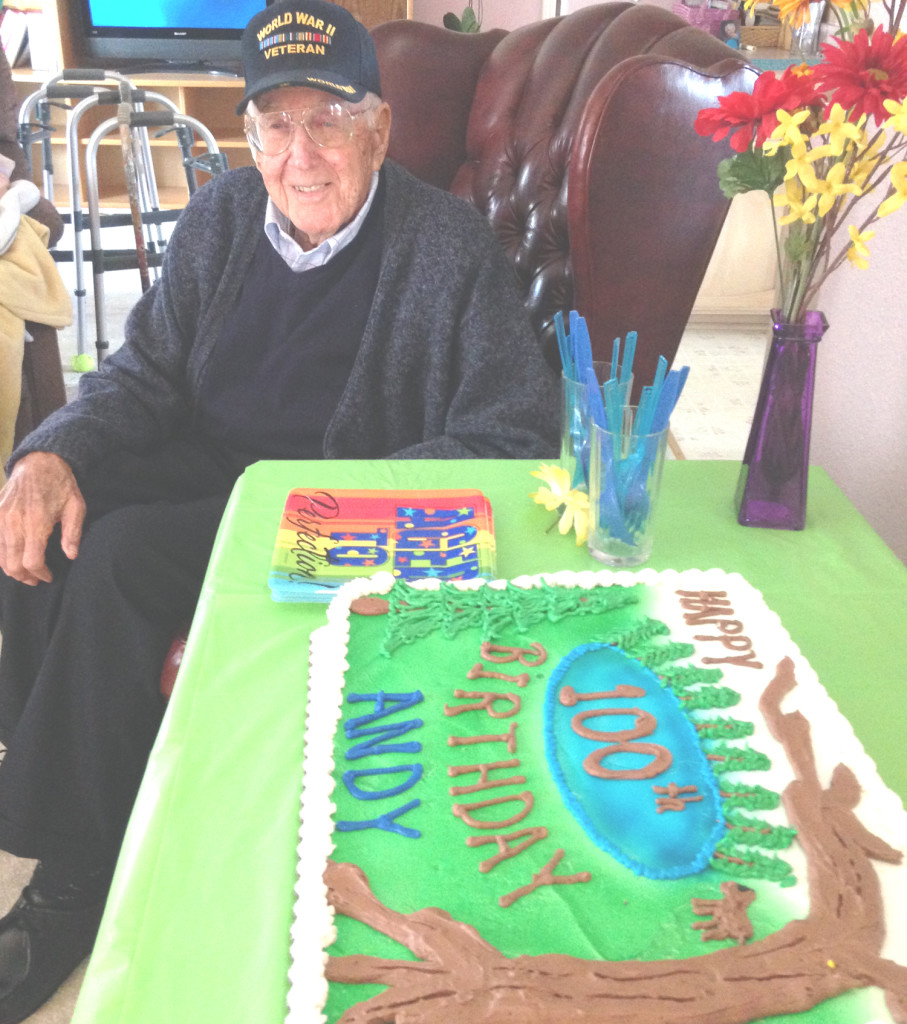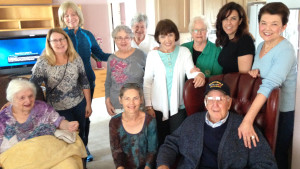Veteran Andy Anderson, friends mark his centennial with Rancho Benicia party

BENICIAN William Bradford James “Andy” Anderson turns 100 on Saturday.
Photos by Donna Beth Weilenman/Staff
“I couldn’t ask for anything more — it’s like paradise!” Anderson said with delight. “It’s the first stop on the way to heaven!”
But Anderson, who turns 100 Saturday, still has plenty of living to do before he takes that next step.
He originally thought he’d live until 103. Lately, he’s decided to extend that to 105.
“I’m going to stick around and make ’em miserable,” he said with a chuckle.
“I’ll leave that to the guy upstairs. I’m not going to outguess him or influence him. I’m just going along!”
Anderson’s full name is William Bradford James Anderson and he came from Portland, Ore. He’s a World War II veteran. Before retiring in 1980, he directed Safeway’s cheese and dairy departments. He received the nickname “Mr. Cheese” from employees and “Grandpa Cheese” from his younger relatives.
When he was a child, he said, things were different. He even became a one-time horse smuggler.
“We moved to Battleground, Wash.,” he recalled during his celebratory coffee klatch at the home of his friend, Ann Hansen.
“Dad had a Dodge touring car.” The car had running boards but no windows — only isinglass curtains over openings.
“We had to cross the Columbia River,” he said, telling his audience about the 5-cent toll his father paid to drive over the bridge.
One important family member couldn’t be left behind: Black Beauty, the pony Anderson rode to school and would ride home — if he remembered to tie the pony well to the hitch. Otherwise, the pony would escape and run home, leaving Anderson to walk the distance.
For the move, Anderson and his father loaded the pony into the touring car and closed the curtains. His father paid the toll and sped across the bridge into Washington before anyone could notice the equine passenger stashed in the back.
“I was a horse smuggler!” Anderson said.
While in first grade, he tricked a school teacher into pushing him into advanced grades.
The school to which he rode Black Beauty had eight grades and was a typical one-room schoolhouse. The teacher was a teenaged girl who sometimes left early to be with her boyfriend.
She told her students to stay in their seats until the school day was scheduled to end, and asked them not to tell their parents.
Anderson threatened to tell unless she promoted him to second grade before he finished first. Before long, he found himself in third grade, too.
When his parents discovered the truth, they enrolled him in a different school. His new principal, a Mr. Stafford, quickly learned the third-grader had gaps in his education. Stafford sent him back to first grade.
“So — that didn’t work!” Anderson said.
But it didn’t interfere with his friendship with Stafford. When his former principal died, he requested Anderson as a pallbearer.
As an adult, Anderson joined the Army Air Corps and served during WWII in what he called “the foreign service.”
Actually, he was sent to Texas, to the single-engine advanced flying school. He operated at a desk for the entire war.
“I was no hero,” he said. “I never flew. I never fought. But I did my duty.”
Texas also brought him his bride. A weeklong courtship began when Anderson met a young Michigan woman named Carol who was visiting Texas relatives.
“I met her on a Monday. We were eating 10-cent hamburgers when I proposed,” he said.
The couple got married for $11.50. They went to a nearby five-and-dime store and bought a $7 ring, and the marriage license cost another $2.
The couple was told they could get married by the justice of the peace next door at the local jail. They walked onto the jailhouse’s sawdust floor, and the justice of the peace called to his wife, “Mabel! Come out! They want to get married and we need a witness!”
After the ceremony, Anderson tipped the man the balance of the $11.50.
The couple’s marriage lasted 66 years. “I lost her four years ago,” Anderson said.
Andy and Carol moved to California in 1947 and raised three children, Cathy Dillard, who also lives in Benicia; James, who lives in Idaho, and Mark, who lives in Hawai’i.
Early in the marriage, Anderson worked for Kraft, in sales for the company’s cheese products.
After 10 years at that job he was hired by Safeway when it started its own corporate cheese and butter department. He worked for 35 years at the national headquarters and then opened multiple plants for the supermarket company.
That’s how he earned the nickname “Mr. Cheese,” he said.
His favorite type? “It wouldn’t be patriotic if I said anything else but American!” he said.
The Andersons lived in Martinez and Rossmoor. They moved to Benicia in 2004, which the couple thought would be a better place for Carol when she became ill.
Since his retirement, Anderson said he’s been having fun.
He loves nature and the outdoors, particularly at his cabin at Blue Lake Springs. He also has been a golfer, though he confessed he always played badly. He also enjoys swimming.
“My hobby is having fun,” he said.
He loves the quietness of Benicia. The city’s sounds are mute enough so he can hear another noise he loves. “When I go to bed at night, I hear the trains puffing across — that’s a great sound,” he said.
Anderson met Hansen when the two were riding their carts through the Benicia Certified Farmers Market. They both were heading toward their Rancho Benicia homes when Anderson dared Hansen, “Want to race?”
Along the way, they stopped at one of Hansen’s favorite places, the Rellik Tavern, for a beverage before they finished their rides home.
That led to his joining in on Hansen’s Wednesday morning coffee klatches.
“We solve a lot of problems,” Anderson said. No longer able to read his daily newspaper, he now listens to the news and other programs. Until his vision worsened, he often would write up his solutions, sending many letters to The Herald.
“He listens to TV, particularly sports,” his daughter, Cathy, said. She often is amazed how her father remembers every play. “He never forgets anything.”
Anderson is the same about politics, she said.
He regularly holds court at Hansen’s house each Wednesday, dishing out wisdom and advice, such as telling another friend, Barbara Wiser, “If you see Obama, have him give me a call.”
“He’s got a sharpness,” Hansen said. “I don’t know how you did it, how you listen to things and get the meat out of it.”
“Sometimes I end up with the gristle,” Anderson quipped back.
He also entertains his friends by telling stories.
One involved his grandfather, Thomas Anderson, who fought in the Civil War and lived until 96, dying in 1936.
 “He fought for the North, and was captured by the South,” Anderson said. Ironically, Thomas became a prisoner of war at Andersonville Prison, the Georgia camp that confined more inmates than any other in the Confederate military.
“He fought for the North, and was captured by the South,” Anderson said. Ironically, Thomas became a prisoner of war at Andersonville Prison, the Georgia camp that confined more inmates than any other in the Confederate military.
Of the 45,000 Union soldiers held there, about 13,000 died from disease, malnutrition, overcrowding or exposure.
But Thomas Anderson had no intentions of staying.
“He escaped,” Anderson said. “He got on a horse bareback and rode out of there.”
But Thomas didn’t leave unscathed. A guard pulled a sword and slashed Thomas on his leg, leaving a long scar he sometimes would show his grandson.
Later, Thomas would live by himself in a hotel, eating oatmeal every breakfast, Anderson recalled. After losing much of his hearing Thomas used an ear trumpet, a tubular device that predated hearing aids.
Even at 96, Thomas was able to outwit a robber who broke into his hotel room and demanded his money, Andy Anderson said.
Feigning disability, the elderly Thomas said, “It’s in my suit,” and motioned to the closet that contained multiple, nearly identical suits.
While the robber was busy searching the suit pockets, Thomas slipped outside and locked the door. Police arrived to find the frustrated robber still inside the hotel room.
That incident was reported in a story about the 96-year-old’s capture of the suspect that appeared on the front page of the Portland Oregonian, Anderson said.
Anderson has been written up, too. His granddaughter, Macy Williams, wrote an article about his 25 life lessons for the online magazine “PopSugar,” and the story was picked up on MSN and Huffington Post — and even was broadcast in France.
“I come from a horse family,” he said. “My family was in the livery business.” His father supplied horses and buggies to local funeral parlors as well as those who used horses or a horse-and-buggy as taxis are used today.
But the Anderson family also had harness horses, and would take their horses and sulkies to multiple county and state fairs in a circuit of racing. As a child, Anderson would accompany his parents and watch their horses streak along, pulling the lightweight sulkies that carried their drivers. “I thought that was the greatest thing,” he said.
Anderson hasn’t lost his humor — or his comedic timing.
“I have some advice to anyone my age,” he said. “There are two things you have to have, because you had a lot of fun and did crazy things during your first century. To relive them, you’ve got to have a good memory.
“The second thing — ” Anderson paused for effect, adjusting his World War II Veteran ball cap. He looked up and grinned, “I forget what that was!”






Leave a Reply